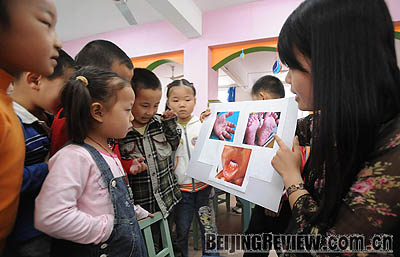|

PREVENTION: Children in a kindergarten in Hefei, capital city of Anhui Province, learn about the hand, foot and mouth diseases. The city has enhanced monitoring and prevention measures following an outbreak of the virus in the province Photo by XINHUA
China's Ministry of Health has stepped up efforts to tackle a deadly intestinal virus that has killed 22 children, all below the age of six, in Anhui Province, the worst-hit area in China.
The ministry dispatched a team to Fuyang City in Anhui to monitor the development of Enterovirus 71, or EV 71, on May 1. EV 71 cases usually peak from March to July. It is very difficult to diagnose in its early stages as it has various symptoms, Li Xinwang, Director of the Contagious Disease Center of Beijing Ditan Hospital, told the official Xinhua news agency.
The virus is among several intestinal viruses that can cause hand, foot and mouth diseases. It usually starts with a slight fever followed by blisters or ulcers in the mouth and on the hands and feet. It might also cause other symptoms, which can complicate the diagnosis process.
Vice Health Minister Liu Qian, who is leading the team in Anhui, said the ministry has decided to include the hand, foot and mouth diseases caused by EV 71 into the legal reporting of infectious diseases to ensure the ministry is aware of any outbreaks.
The hand, foot and mouth diseases, which did not have to be reported before, now rank in the third category, the lowest in the system, along with tuberculosis. Plague and cholera are in the first category while hepatitis, AIDS and rabies are among diseases in the second category.
Another 2,946 EV 71 cases had been reported in Fuyang as of 11 a.m. of May 2. Of the children infected with the intestinal virus, 849 have recovered while 879 remained hospitalized, including 40 who were seriously ill and nine in critical condition, according to Gao Kaiyan, Director of Anhui's Health Bureau.
More than 700 beds have been put into use in Fuyang's hospitals. Another 1,200 beds have been prepared for future patients, according to Xinhua reports. The city's command headquarters for prevention and treatment of the disease has created a rapid regulation stating that all medical costs for treatment will be reimbursed to the parents of infected children.
Meanwhile, 10 people in Hong Kong had also been stricken by the virus as of May 2.
One of the Hong Kong victims was a woman, who caught the disease from her four-year-old daughter on April 24. Both have recovered and been released from hospital.
The symptoms of the outbreak in Fuyang were unusual, a medical veteran who has been engaged in the disease treatment in Fuyang told Beijing Review in e-mail. A pustular rash on the hands and feet that affected children was not serious but there was critical cephalitis and pulmonary infection.
Close contact
The EV 71 virus has spread all over the world since it was detected in 1969 in the United States, according to Zhu Qirong, a Chinese expert on epidemics with the Chinese Medical Association. EV 71 epidemics occurred in Australia and Bulgaria in the 1970s and in Asian countries such as South Korea, Japan and Malaysia in the 1980s, said Zhu.
"There was a serious outbreak of hand, foot and mouth disease in Taiwan in 1988, which infected 140,000 children and took 78 lives. Afterwards the disease broke out every year and in 2000 about 100,000 people were infected with it and 30 of them died," he added.
Children of less than five years old are the most vulnerable to EV 71, which spreads via close contact between people.
Very few adults get the virus and even if they are infected, they just show symptoms similar to a bad cold, said Li Shuangjie, a doctor in the ministry's special team.
Yang Weizhong, Deputy Chief of the Chinese Center for Disease Control and Prevention, advised parents to sanitize daily items such as toys, diapers and dishes if they find their children show symptoms of fever or rash. They should also pay attention to personal hygiene and keep rooms well ventilated.
Infected children should see a doctor as soon as possible and stay home to prevent the virus from spreading, Yang added.
Zhu suggested worried parents could help to prevent their children from catching the virus by avoiding crowded places during the high-incidence season. | 